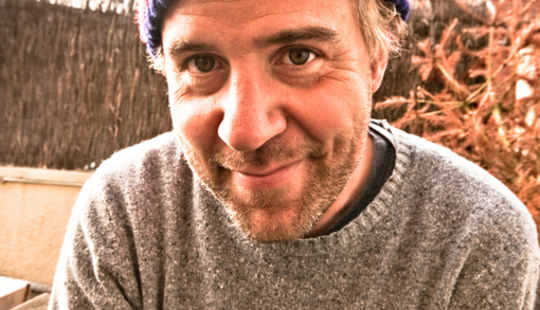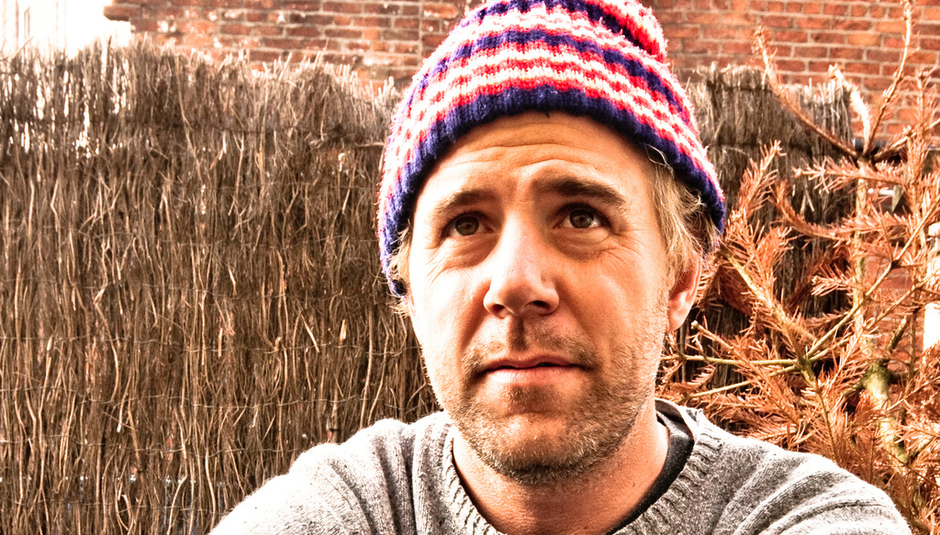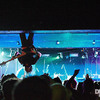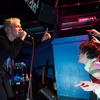Almost exactly three years after Grandaddy released their final album, Just Like The Fambly Cat, the frontman of the Modesto, California-based band is making his return to the music scene. Jason Lytle's first album under his own name, Yours Truly, The Commuter, was released last week, and he is currently embarking on his first European tour in more than five years, which brings him to Manchester’s Academy 3 tonight, London's Islington Academy on Thursday, and Primavera Sound at the weekend.
Before crossing the Atlantic for the tour, Lytle put out a question on his official message board, asking if any of his fans and followers knew of a place in the UK, where he and his band could stay for a while as they rehearsed for their tour. Greg Braysford, a DJ, promoter and long time Grandaddy fan from Preston, offered exactly what Lytle was looking for, and it was in this northern town that we got a chance to sit down with Jason Lytle on the eve of the release of his album. The conversation took on a life of its own, and the result is exceptionally honest and - in all probability - the longest interview that Lytle has ever done. Here DiS presents part one of four, in which Lytle discusses those Grandaddy days.

DiS: What Grandaddy moment are you most proud of?
Jason Lytle: Not to immediately start twisting your questions into something else, but one of my favourite things that used to happen on occasion was when I found myself or the band in these ridiculous situations. It was usually wonderful things. Like one minute before walking on stage to play the David Letterman show, the Conan O’Brien show, or Glastonbury. There’s the normal stage fright anxiety that accompanies all of those situations, but I would have these little bright moments of just thinking "how did we get here? Why are we here?" It was as if we’d snuck in the backdoor. And every time that happened, I was always really proud and really looking forward to it. It’s obviously something you can’t start to expect or premeditate, but it was always really nice for me to witness those moments. And I would keep them to myself. I would sort of look at everybody, and I would just go ‘god, this is hilarious, you bunch of dirtbags’! [laughs]
DiS: Was there a specific concert that was the highlight?
JL: Probably Glastonbury. We had really pushed the limit in terms of intake and celebration. We barely slept, it was crazy. The whole thing was insane. But we felt the pressure to really benefit fully from the whole experience. So I was a little bit worried, when it came time to play, if we were gonna hold it together. I was pushing my own limits of being exhausted and just drunk enough, but just having fun. The sun was going down and the sky was doing all these weird colours. People just kept flowing in, and there was a lot of magic going on that night.
DiS: Do you have an album that you’re more proud of, compared to the other ones?
JL: Um… [thinks for a long time] That really is a difficult question, ‘cause I really go into all of them, with whatever’s going on in my life, with the best intentions. They’re so damn personal to me. It’s a valid question, but I look at the whole body of work as just this thing that’s still happening. I don’t wanna look at them as these old yearbooks or these sad postcards from a time gone by. And if anything, I would pluck songs from each album. Obviously I’m really close to all of them, having recorded the stuff myself and been there for every step of the process. I’m like Mr. Miyagi, teaching and training and moulding the songs, and eventually you just gotta let your students go. They’re gonna do what they gotta do in the outside world. And they’re still doing it, you know.
DiS: The story of Grandaddy is often told as if you guys didn’t 'make it'. But you did release a ton of music, you received a lot of critical praise and got to tour all around the world. Does that sound like a failure to you?
JL: No. If anything, it goes back to what I mentioned before. I’d never been anywhere. I’d never left the country. I’d done a lot of travelling around through skateboarding, lots of road trips, but I knew that my life was pretty much carved out. I knew that I was gonna work a pretty menial job – in a warehouse or some job that there would be absolutely nothing fantastic about. So once the Grandaddy thing started to take off, certain aspects of it was really frustrating for me. I have dealt with issues of depression over the years, so sometimes it’s hard for me to hide the fact that I’m just not feeling very happy. But then I would be put into these positions where I would have to talk about, "hey! It must be great, you get to travel and to see all these things!", and of course it is. But sometimes… I don’t care who you are – if you’re feeling a certain way, you’re just bummed out. So I would rather not talk to anybody than talk too much about it. But it was pretty incredible. We had quite some experiences, and all of it was because of Grandaddy – because of this music. I would never have been able to experience any of that stuff without it.
DiS: At the second to last five-piece show at Bonnaroo in 2004 you introduced the Pavement cover song 'Here' with the words “here’s a song by a band that had the sense to bow out gracefully”. How important was it for you to repeat that?
JL: I can’t imagine doing it any other way. It was like an album ending. Or – you know how sometimes you get to that point where a movie ends, and you’re just like "what!? It ended like that!? Nooooo!". And unfortunately there are these delusions of grandeur that accompany so many people who end up in the entertainment industry, and you have these bright, burning moments, and you wanna keep the dream alive at any cost, and it can get a bit sad. It’s too easy to use Spinal Tap as an example, but there’s too much of that.
DiS: What kind of scenario did you worry would unfold if you hadn’t done it the way you did?
JL: I was really aware of all the little nuances of the evolution. Not having children, the band was my everything. I watched it evolve, and I had hopes for it, and if there were certain things that bothered me, I would do what I could to help those things along. Encourage certain things and discourage others. Trying to be fair through all of it as well. And I don’t know what the comparison would be, where you finally had to let go – but it came to a point where I was dealing with the fact that there were all these grown men that had all been a part of this thing, and this thing was done. There was too big of a threat of all these other factors becoming way more important than the music. You knew it was gonna end, and there’s never a good time, but it was just one of those situations of ‘the sooner, the better’, ‘cause we all had the abilities to move on with our lives at that point. But I really think we rode that wave as long as we could, and then we were washed up on shore.
DiS: Do you see things in a different light now compared to three years ago, when Grandaddy came to an end? Are there things that you understand now, or appreciate perhaps, that you didn’t three, three and a half years ago?
JL: I don’t have any regrets regarding how the course of the whole Grandaddy thing happened – the whole journey – but I really feel a lot of relief. I’m much more comfortable being responsible for myself and trying to run my own show. It was a great exercise to bring all these guys into my world and to get good at dealing with people and being more synergistic. But I’m the best that I can be when I’m on my own. When I’m deep inside my head and I’m digging around for things that only I can come up with when I’m by myself. And it got weird, ‘cause there were way too many people involved – and not just with the band, but with label people and crew people anticipating the next step. So it’s a big relief for me to just be standing there at a crossroads, looking in that direction and that direction, deciding which way I wanna go and saying ‘fuck it, I’m going that way!’. I account for my own decisions and I don’t have to feel bad when somebody regrets that I went in that direction and ended up getting eaten by wolves, when it wasn’t my fault.
Video: Grandaddy: 'Jed's Other Poem (Beautiful Ground)'
DiS: Is there a personal responsibility towards other band members that is now gone, which is part of the relief that you feel?
JL: Well, it was just a weird concept altogether. This whole ‘being a band’. It’s like the boy scouts. You can’t be in them forever. You gotta grow up, you gotta take what you learned by being in the boy scouts. In terms of that theory having any weight, I wanted to make sure that I was being fair, while we were in the boy scouts, but at some point it’s time to take these lessons of how to build a fire and how to construct a shelter with you. It’s weird, ‘cause I have friends that have gotten into the Hell’s Angels and biker gangs, and there’s this weird thing that guys have about being in a pack. And I was always more into running or playing tennis or stuff that was mind-oriented. It was never very natural for me to be part of a team.
DiS: Why do you think that is?
JL: I don’t know. I spent a lot of time by myself when I was a little kid. I got results from it. I drew pictures. I wandered around a lot. We lived out in the country, and I didn’t have a whole lot of friends. I listened to a lot of music. I really loved to draw. I was really into drawing Star Wars and superheroes and stuff like that.
DiS: What Star Wars characters?
JL: At one point, I could pretty much draw all of them.
DiS: Which one was your favourite to draw? Jabba the Hutt?
JL: No, probably Han Solo, actually.
DiS:‘Cause he was the guy you identified yourself with? The solo star of the pack, so to speak?
JL: [laughs] Wow, you’re tapping into something here! Possibly. Good point!
DiS: The UK has sometimes been said to be able to appreciate American music in a way that the US haven’t. How did you experience this difference?
JL: Actually, I haven’t bought into that whole theory. It was always a sore subject for me with Grandaddy, ‘cause I always thought that we were a very, not only American band, but Californian band. So all of a sudden we’re playing all these places and getting all this press and coverage in the UK, and I was like "this is great – but what the fuck?". A lot of it was a logistical thing, though. Right when it all started to take off, we had all these nightmarish problems with our label in America, so rather than the band just dying or treading water, we got picked up by our label in the UK, V2, and there were all these great opportunities, and people just sort of connected with our weirdness. If anything was slightly annoying, it was that they focused a little too much on the beards and that we looked like… forklift drivers. Instead of musicians, you know. But it was funny, and any press is good press, as long as it doesn’t overshadow the music completely. It was nice when things finally started to even out a bit after we got sorted things out at home. That was very reassuring for me. But at some point, you just have to go where they like you and not really ask questions and just go ‘fuck it, they like us, great! Will you have us back, please?’. [laughs]
DiS: How about The Beach Boys, who were, from my understanding, more appreciated in the UK and Europe than they were back home. You don’t agree that there’s a European sensibility that Americans apparently don’t have?
JL: I don’t know. I think I like the fact that I’m naïve to that. It’s never strongly dictated anything in my mind. I don’t wake up and go "woah, I’m American and I should like this!". I don’t do that. I love listening to the Kaiser Chiefs, but some of the slang – I don’t quite get it, but I love listening to them! I think they’re a fucking great band. And I certainly don’t worry about the guy sitting next to me on the bus back home – whether or not he likes the Kaiser Chiefs. I really like the one they did before the newest one.
DiS: Yours Truly, Angry Mob?
JL: Yeah.
DiS: Is that where you got your own album title from?
JL: No! Although for a second I was a little concerned, but yeah – you can do worse than having that sort of connection. There’s a song on there that I really like. [sings quite a bit of 'I Can Do Without You']
DiS: You should cover it, for these UK shows.
JL: Actually, for the live shows I made an outro cd. Like a mix. And that’s one of the songs on there. But anyways, I find my own connection with a band and just go with it. I’m not trying to simplify the whole thing. But at some point we have to take responsibility and start being individuals! [laughs]
DiS: But you used to introduce Grandaddy as a "bunch of hillbillies who like to camp and stuff". You set yourself up as something that was as American, but very different from Hollywood and what people often associate with American bands.
JL: It had a huge influence on why we were able to develop into whatever we developed into. I can only imagine what people thought when we walked out on stage. Let’s just say they heard a few of the songs, and in your mind you don’t know what they guys are gonna look like. And probably more often than not, we threw people off a little bit with our crappy gear on stage and me looking like whatever I looked like at the time. Jim was good-looking, and Aaron is back there chain-smoking, wearing a fucking Slayer shirt, playing this beautiful, little fluffy beat. It was all very confusing, you know! And we’re all pounding beers through the whole thing, trying to play this pretty music. But the funny thing is that it was all very real. We were a product of what we came from. And we loved the fact that we resisted moving to LA – or even San Francisco, which wouldn’t have been so bad, but we realized that in order to develop and become our thing, we had to stay in Modesto. And I probably got a little long-winded talking about it on stage now and then, but I was just trying to let people know about it, and it always seemed like an appealing idea to me. I think that’s why I would always mention it. Who knows, maybe 80% was like ‘who gives a shit – play that one song we’ve heard on the radio’. But I love the fact that there’s a story behind the band. It adds a little more depth to it.
DiS: Did you notice any of the news stories that appeared when you shaved off your beard?
JL: Yeah. Now I’ll let my facial hair grow for four or five days, and it drives me insane. I can’t believe I ever even had a beard for that long. God.
DiS: Is Grandaddy coming back together? I notice you have facial hair!
JL: [laughs] Every time I get the tendency, I’m gonna fire up the razor. That’s how I’m holding the Grandaddy thing at bay. If somebody steals my razor, there’s a good chance the band might reform! [laughs]






















